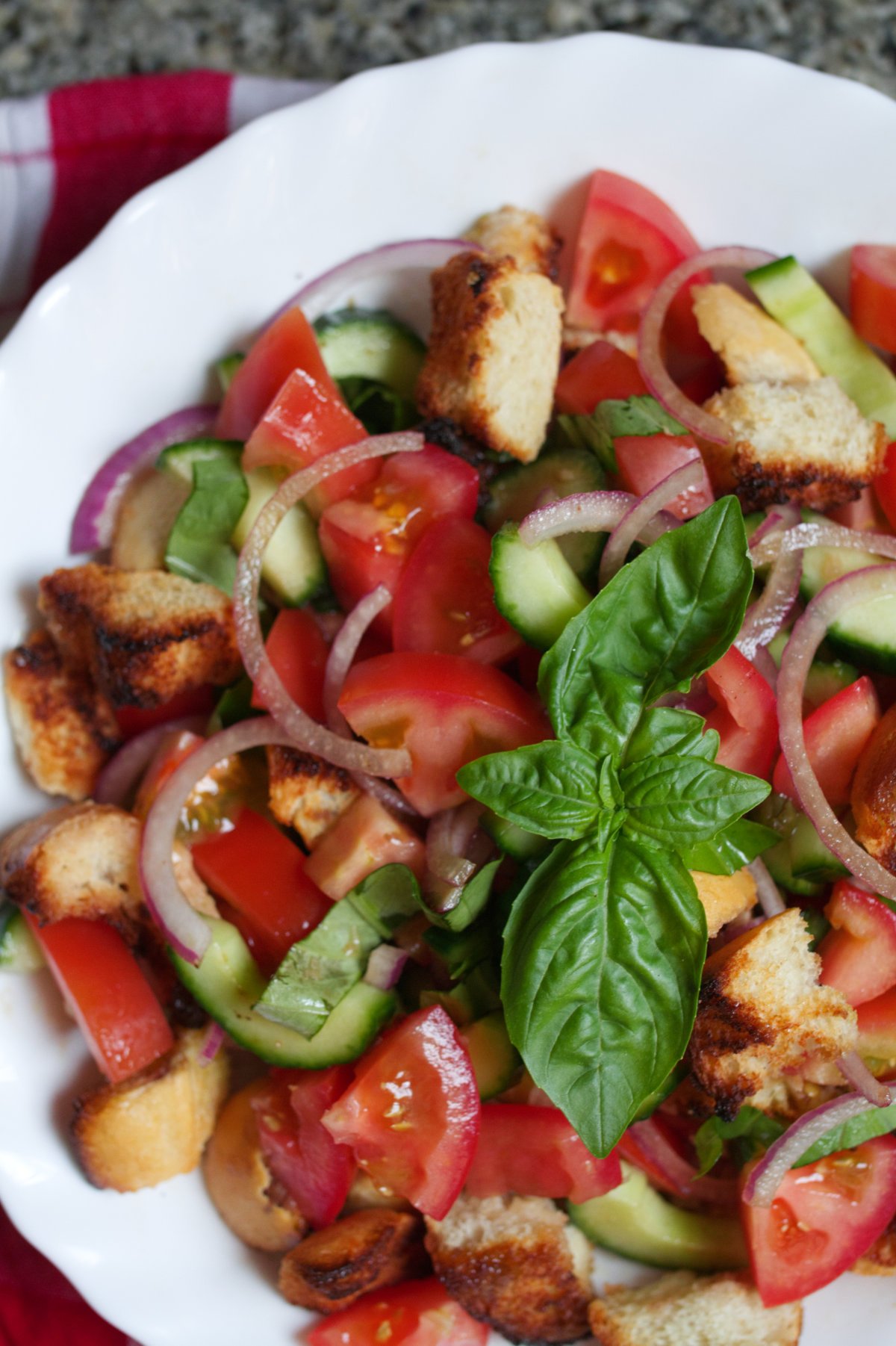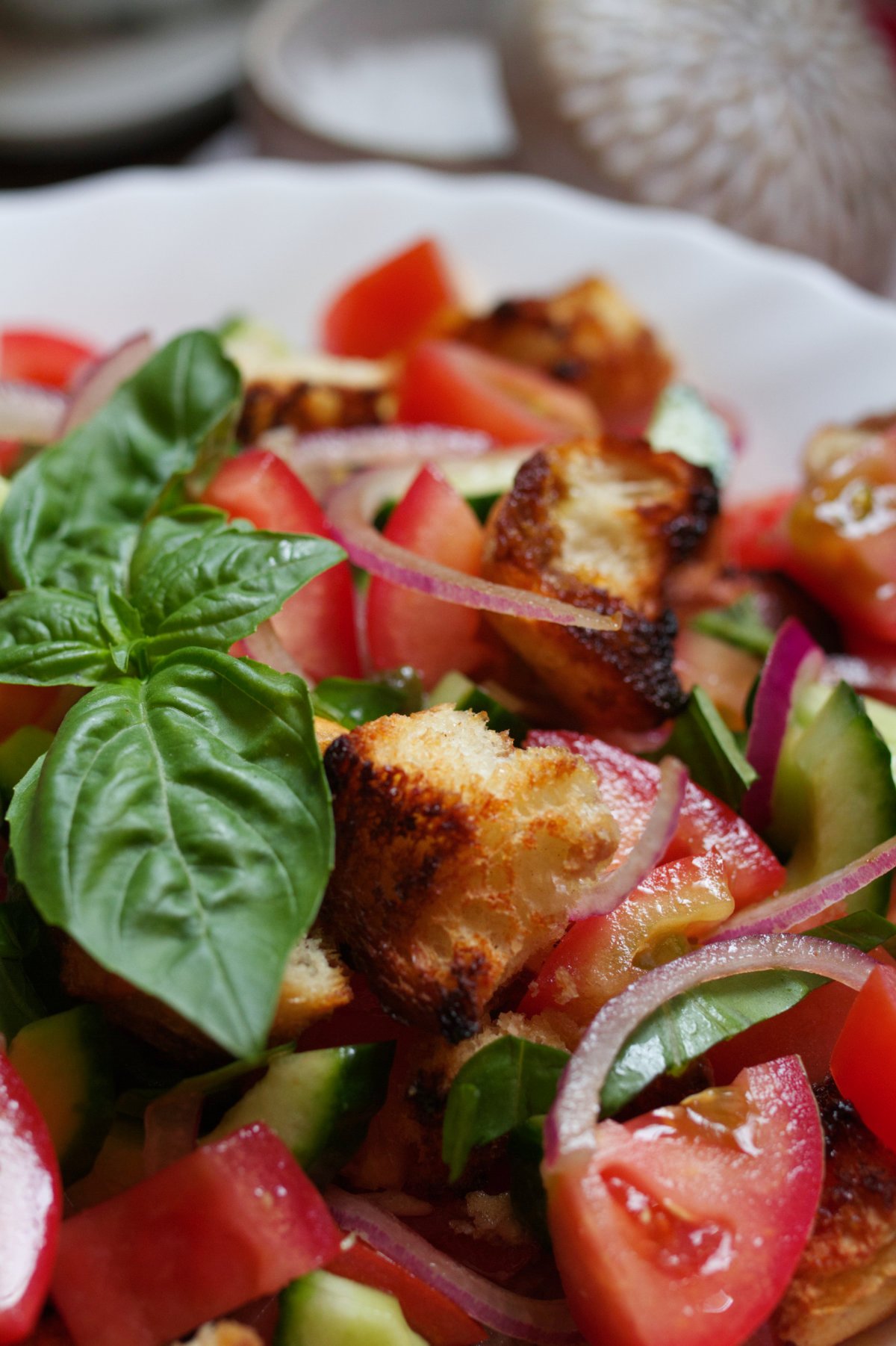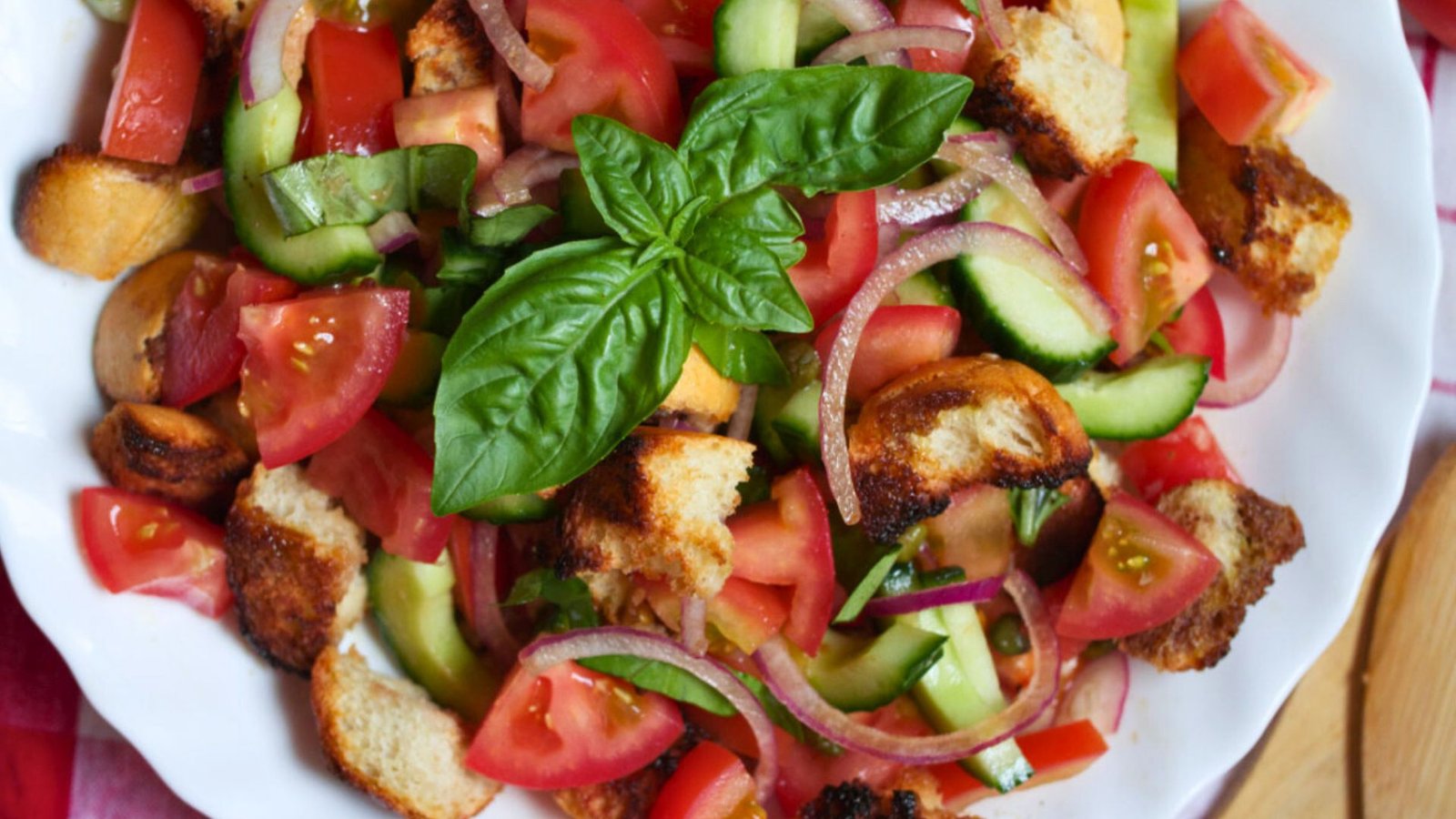Panzanella Salad is a classic Tuscan tomato and bread salad that embraces bold flavors and refreshing textures all in one salad. The fresh and seasonal ingredients reflect warm summer days where something refreshing is in order, and this is achieved with the use of plenty of fresh herbs such as oregano and basil.
Of course, the stars of the show are fresh ripe tomatoes (Roma tomatoes are ideal) and some old stale bread, although fresh bread can also be used and easily toasted. I opted for the latter version and was pleased with the result. To top things off is the simplest of salad dressings – A dash of red wine vinegar and some good quality olive oil.
Whether you’re serving it as a side dish alongside your favorite main meal or as a light and refreshing lunch, this Panzanella Salad recipe is sure to please.
- Ready in: Under 10 minutes
- Prep time: 8 minutes
- Cook time: 1-2 minutes
Salad | Healthy | Italian | Bread | Tomatoes
Table of contents:
How to Make Panzanella Salad – Tuscan Tomato and Bread Salad
🥗 Weight-Loss-Friendly Panzanella Salad Recipe
Ingredients (4 servings):
- 1½ cups whole grain or sprouted bread, cubed and lightly toasted (about 100g)
- 400g ripe tomatoes, diced
- ½ English cucumber, seeds removed, cut into half-moons
- ½ small red onion, thinly sliced
- 1 clove garlic, minced
- 1 tbsp capers, rinsed
- 1 small handful fresh basil, chopped
- 1 tbsp Red Wine Vinegar
- 1 tbsp Extra Virgin Olive Oil
- Salt and pepper to taste
Equipment
- Large Glass bowl
- Salad Serving spoons
- Large baking sheet
- Parchment paper
- Chef Knife
- Bread knife
- Wooden Cutting Board
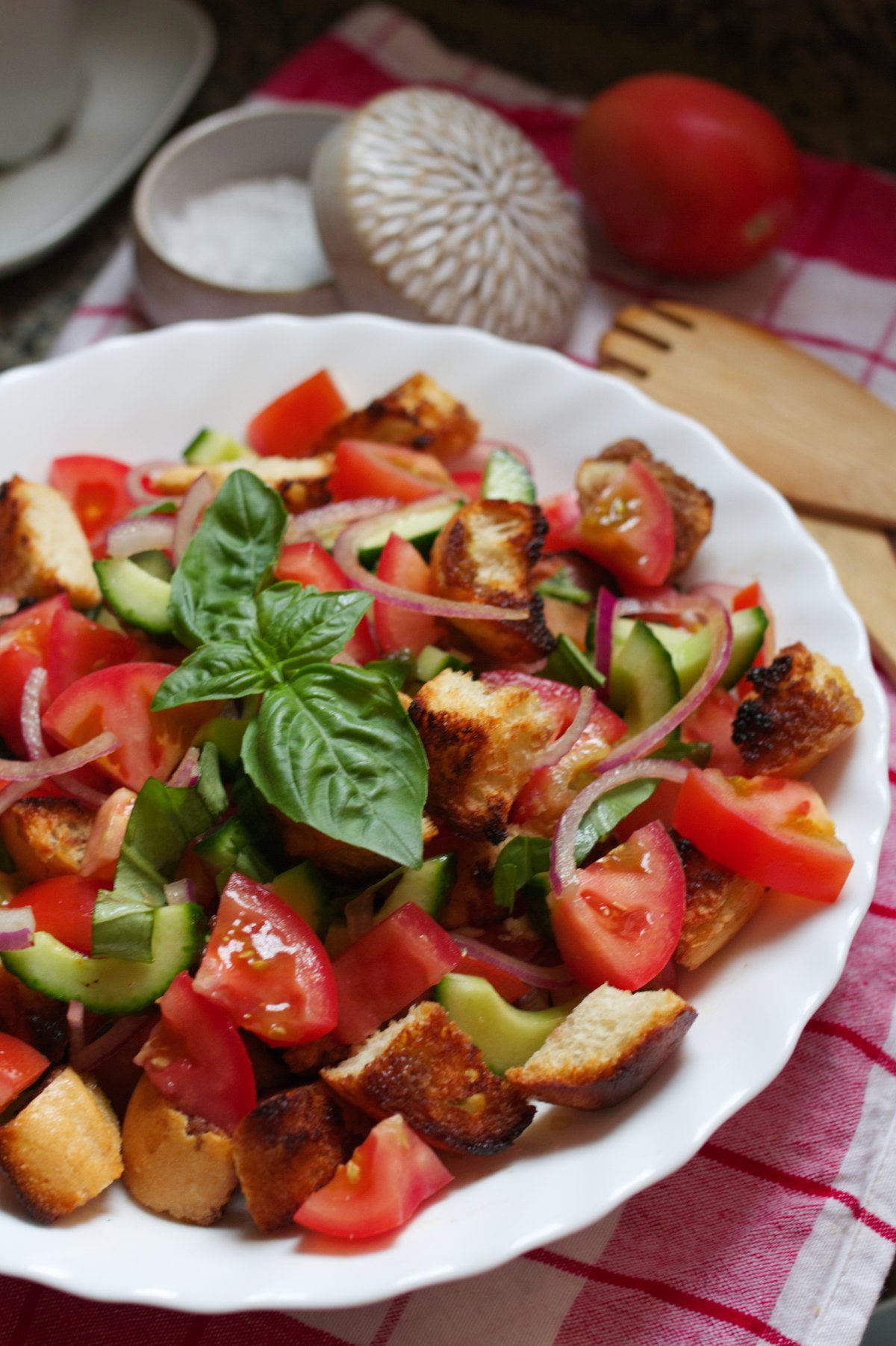
Step-by-Step Instructions
Step 1 – Cut and Toast Bread
Note: Traditional recipes use day-old (stale) bread.
- Preheat oven grill to 200°C / 400 °F
- Cut bread into bite-sized cubes
- Add cubed bread to a lined baking sheet and bake for 1-2 minutes or until toasted (Bread should be golden brown, but not black).
- Remove from the oven and set aside for use later.
Step 2 – Prepare Salad
- Prepare all veg ingredients as noted above.
- Add the tomatoes, cucumber, and red onion to a large bowl.
- Add the crushed garlic, toasted bread, capers, and around half of the fresh chopped basil with a splash of red wine vinegar, some olive oil, and salt.
- Give everything a gentle mix and test the flavor.
- Add more oil or salt if required.
Step 3 – Serve
- Plate salad onto individual bowls and garnish with the remaining fresh basil leaves.
- (optional:) Add some freshly grated Parmesan cheese.
Cooking tips:
Use it or lose it
Stale bread is traditionally used to make Panzanella Salad. For best results, cut some fresh bread into 1-inch-thick pieces, then leave it out (uncovered) overnight. By morning, the bread will have sufficiently hardened and be easier to cut into small cubes.
Toasting the bread
As an optional step, I like to lightly toast the bread under the broiler/grill until it starts to char slightly. It gives the bread more color and flavor.
Reduce onion sharpness
Red onions can be very sharp in flavor. To reduce the sharpness, once the red onion is sliced, add it to a bowl of iced water for 5 minutes. Then, remove the onion and pat dry.
Origin of Panzanella Salad
Panzanella salad is a traditional Italian dish with roots in Tuscany, though it is also popular throughout central Italy. Its origins date back to at least the 16th century, with the earliest references found in the writings of the poet Agnolo Bronzino, who praised a salad made of onions, oil, and vinegar served with toast or stale bread.
Panzanella was originally a way for farmers and rural families to use up stale bread rather than waste it. Today, Panzanella is a popular summer dish, known for its fresh, rustic flavors and its use of seasonal produce and leftover bread.
Traditional Ingredients:
- Salt & pepper
- Stale Tuscan bread (unsalted)
- Tomatoes
- Red onion
- Cucumber
- Basil
- Olive oil
- Vinegar
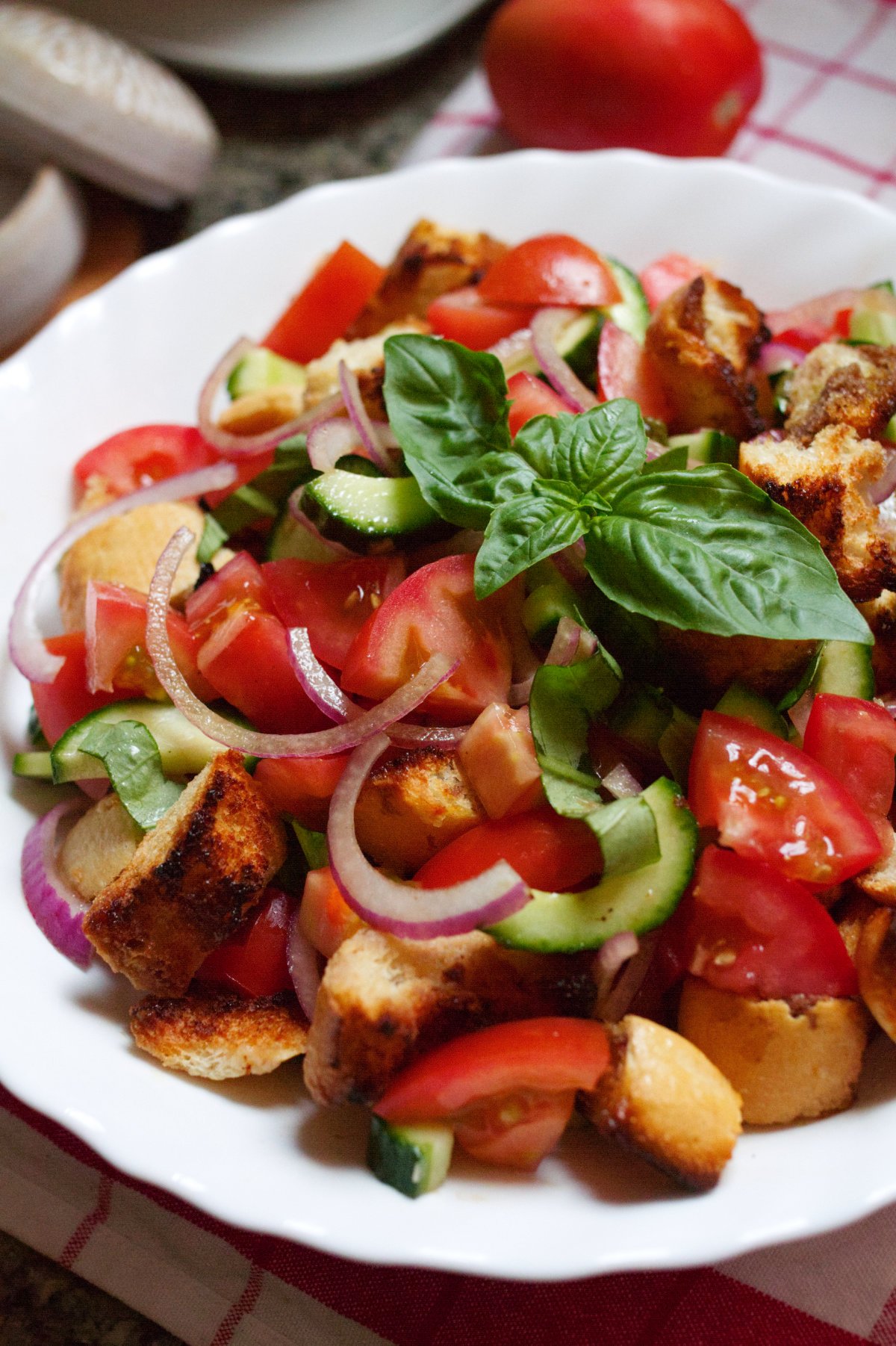
Best tomatoes to use for Panzanella salad
For Panzanella salad, the best tomatoes are ripe, juicy, and flavorful—since they’re a star ingredient and their juices help soften the bread and create the dressing base. Here are the top choices:
✅ 1. Roma Tomatoes (Plum Tomatoes)
- Why: Firm, less watery, and rich in flavor
- Best for: Traditional recipes and less soggy salads
✅ 2. Heirloom Tomatoes
- Why: Deep flavor, vibrant colors, and juicy flesh
- Best for: Fancy or seasonal versions
✅ 3. Cherry or Grape Tomatoes
- Why: Sweet, low moisture, and great texture
- Tip: Halve them to release juices without overpowering the bread
✅ 4. Vine-Ripened Tomatoes
- Why: Balanced acidity and sweetness, juicy without being watery
- Best for: Everyday salads with good flavor
A note on moist tomatoes
The moisture content of tomatoes is typically very high, as they are composed mostly of water. The average moisture content for fresh tomatoes in usually in excess of 90-95% water. So, with that in mind, you will likely want to remove some of the moisture from the tomatoes before adding them to the bread.
As you can see in the cooking video, I used ripe plum tomatoes and when they were sliced, they didn’t let go of too much moisture.
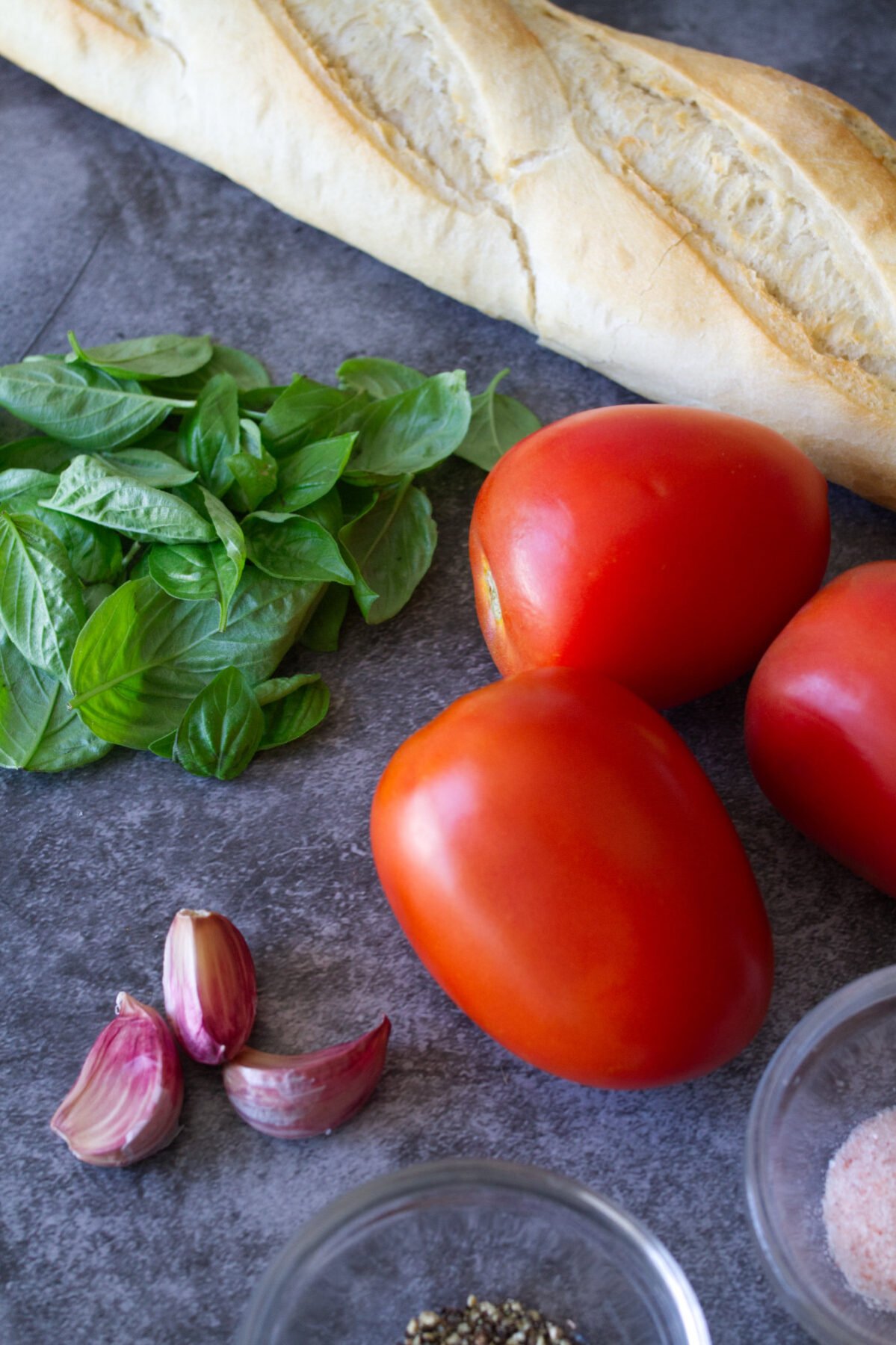
How to remove excess water from tomatoes for use in salads
To remove excess water from tomatoes for salads, especially when you want to avoid a soggy result, here are a few effective methods:
✅ 1. Deseed and Remove Watery Pulp
- Cut the tomato in half horizontally (across the “equator”).
- Scoop out the seeds and the watery gel with a spoon or your fingers.
- This removes the most water-rich part without losing too much flesh.
✅ 2. Salt and Drain
- Dice or slice the tomatoes.
- Sprinkle lightly with salt and place in a colander over a bowl or sink.
- Let the tomatoes sit for 10–30 minutes to draw out water.
- Pat dry with paper towels before adding to your salad.
🧂 Tip: Use just a pinch of salt—too much can make the tomatoes mushy or overly seasoned.
Ingredient substitutions and recipe variations
While personally, I find this traditional version of Panzanella to be ideal, there is plenty of scope to mix or swap ingredients based on your own dietary preferences.
🥖 Bread Substitutions
- Traditional: Stale Tuscan or country-style sourdough bread.
- Substitutes:
- Ciabatta, baguette, or any rustic loaf
- Gluten-free bread (toasted or dried for firmness)
- Cornbread or focaccia (for a softer, sweeter variation)
Tip: Always toast or dry the bread if it’s too fresh—it should absorb dressing without getting soggy.
🍅 Vegetable Variations
- Standard: Tomatoes, cucumbers, red onions.
- Optional Adds or Swaps:
- Roasted bell peppers
- Avocado (for creaminess)
- Radishes (for crunch and peppery bite)
- Grilled zucchini or eggplant
- Sweet corn
- Cherry or heirloom tomatoes (for color and flavor variety)
🌿 Herbs & Greens
- Classic: Fresh basil
- Alternatives:
- Mint (fresh twist)
- Parsley, oregano, or chives
- Baby arugula or spinach (adds greens to the mix)
🧀 Additions
Some Panzanella recipes call for the use of Italian cheese as a light garnish to enhance flavors.
Optional cheeses:
- Mozzarella (fresh or pearls)
- Parmigiano-Reggiano shavings (fresh)
- Feta (adds saltiness)
- Ricotta salata
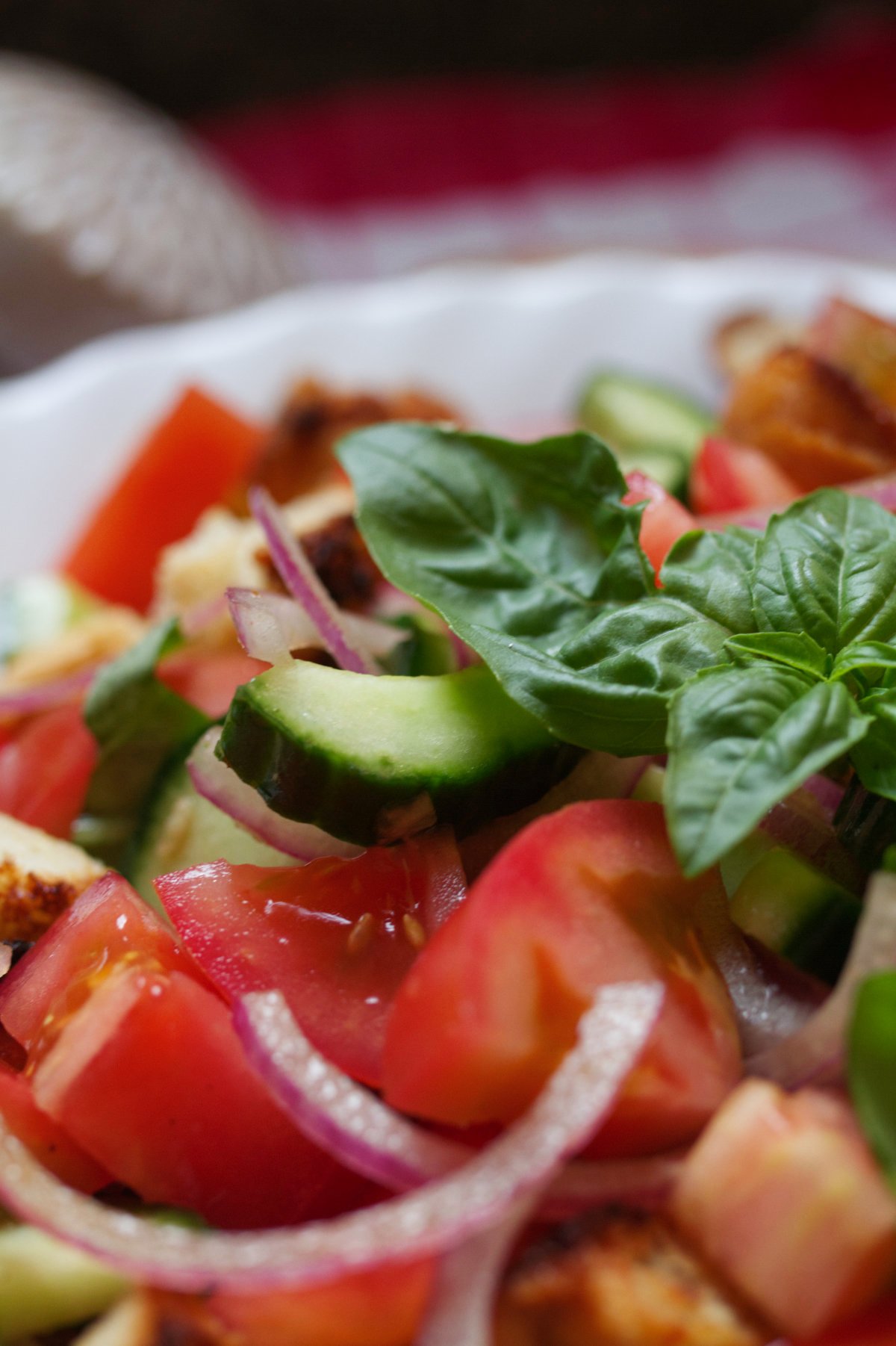
Is Panzanella Salad healthy?
Yes, Panzanella salad is generally considered a healthy recipe, especially when made with fresh, wholesome ingredients.
With a little over 180 kcal per serving, this salad is rich in vegetables (tomatoes, onion, cucumber) that are packed with antioxidants, Vitamins A, C, and K.
Healthy Salad Dressing
Like many recipes in Mediterranean cuisine, a salad dressing is made using vinegar and oil, and this recipe traditionally uses red wine vinegar, the vinegar most common in the region of Tuscany where this salad originates.
When it comes to oil, a good quality olive oil or extra virgin olive oil is used. EVOO is well known for its numerous health benefits, including: Anti-inflammatory compounds, Monounsaturated fats that are heart-healthy, and Improved absorption of fat-soluble vitamins.
Discover more about Olive Oil in our helpful guides:
- The Role of Olive Oil in a Healthy Diet
- Mediterranean Elixir: Olive Oils, Their Origins, and the Magic Within
- How Olive Oil Can Help You Lose Weight
- Which is better for your health: Avocado oil or Extra virgin olive oil
No Added Sugars, Colors, Additives
This recipe contains no added sugars compared to many commercial salads or dressings. Panzanella is a balanced, nutrient-rich salad when made with high-quality bread, fresh vegetables, and modest olive oil. It can be tailored to many diets and is a smart, tasty way to reduce food waste (using stale bread!).
⚠️ Health Considerations:
1. Sodium Content
- Capers and bread contribute a moderate amount of sodium
- Tip: Use low-sodium bread or rinse capers to reduce salt
- Tips of the various types of salt can be found it this guide: Guide to Salt
- What is Healthy and What to Avoid
2. Bread Type Matters
- White bread is less nutritious (lower fiber, higher glycemic index)
- Tip: Use whole grain, sourdough, or multigrain bread for a healthier version
3. Portion Control
- Adding extra olive oil or cheese (if used) increases calorie density
- Tip: Measure oil, or bulk up with more veggies to lower calorie-per-serving
Nutrition Facts
Nutrition facts per serving (based on 5 servings) for your Panzanella salad recipe:
| Nutrient | Per Serving | % Daily Value (DVI) |
| Calories | 186.8 | 9.3% |
| Carbohydrates | 27.5 g | 10.0% |
| Protein | 4.7 g | 9.5% |
| Fat | 6.7 g | 8.6% |
| Fiber | 2.6 g | 9.3% |
| Sodium | 238 mg | 10.3% |
Note on Nutrition:
- Olive oil is the primary fat source—adjust the amount to reduce calories/fat.ve.
- These values are estimates based on typical ingredient profiles.
- Sodium is notably higher due to capers and bread; reduce capers or use low-sodium bread if needed.
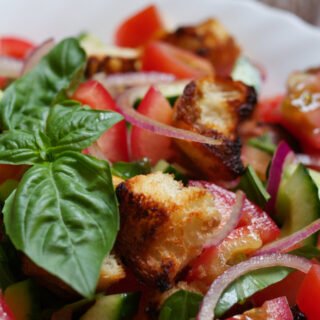
Panzanella Salad (Tuscan Tomato and Bread Salad)
Equipment
- large glass bowl
- Salad Serving spoons
- Large baking sheet
- Parchment paper
- Chef Knife
- Bread knife
- Wooden Cutting Board
Ingredients
- 1½ cups whole grain or sprouted bread cubed and lightly toasted (about 100g)
- 14 oz. 400g ripe tomatoes, diced
- ½ English cucumber seeds removed, cut into half-moons
- ½ small red onion thinly sliced
- 1 clove garlic minced
- 1 tbsp capers rinsed
- 1 small handful fresh basil chopped
- 1 tbsp Red Wine Vinegar
- 1 tbsp Extra Virgin Olive Oil
- Salt and pepper to taste
Instructions
Step 1 – Cut and Toast Bread
- Note: Traditional recipes use day-old (stale) bread.
- Preheat oven grill to 200°C / 400 °F
- Cut bread into bite-sized cubes1½ cups whole grain or sprouted bread
- Add cubed bread to a lined baking sheet and bake for 1-2 minutes or until toasted (Bread should be golden brown, but not black).
- Remove from the oven and set aside for use later.
Step 2 – Prepare Salad
- Prepare all veg ingredients as noted above.
- Add the tomatoes, cucumber, and red onion to a large bowl.14 oz. 400g ripe tomatoes, diced, ½ English cucumber, ½ small red onion
- Add the crushed garlic, toasted bread, capers, and around half of the fresh chopped basil with a splash of red wine vinegar, some olive oil, and salt.1 clove garlic, 1 tbsp capers, 1 small handful fresh basil, 1 tbsp Red Wine Vinegar, 1 tbsp Extra Virgin Olive Oil
- Give everything a gentle mix and test the flavor.
- Add more oil or salt if required.Salt and pepper to taste
Step 3 – Serve
- Plate salad onto individual bowls and garnish with the remaining fresh basil leaves.
- Optional: add a few shavings of Parmesan cheese for some extra flavor.
Video
Notes
Cooking tips:
Use it or lose it Stale bread is traditionally used to make Panzanella Salad. For best results, cut some fresh bread into 1-inch-thick pieces, then leave it out (uncovered) overnight. By morning, the bread will have sufficiently hardened and be easier to cut into small cubes. Toasting the bread As an optional step, I like to lightly toast the bread under the broiler/grill until it starts to char slightly. It gives the bread more color and flavor. Reduce onion sharpness Red onions can be very sharp in flavor. To reduce the sharpness, once the red onion is sliced, add it to a bowl of iced water for 5 minutes. Then, remove the onion and pat dry.